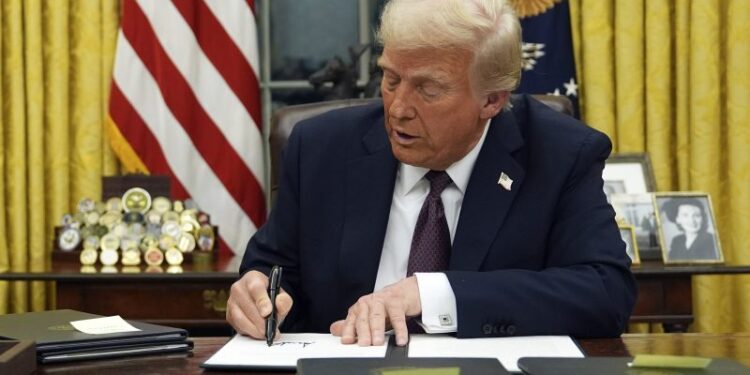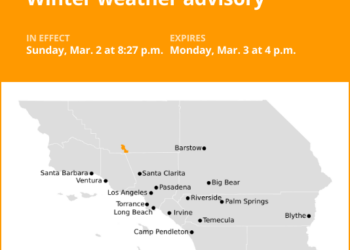
Potential TikTok buyers are lining up as President Trump and the Chinese government show heightened interest in striking a deal to sell the popular video-sharing platform in the face of a U.S. ban.
YouTube star MrBeast is the latest to join the ranks of prospective buyers, following a joint bid from former Los Angeles Dodgers owner Frank McCourt and “Shark Tank” star and investor Kevin O’Leary. The Chinese government has also reportedly considered Elon Musk as a buyer, while Trump threw Oracle founder Larry Ellison’s name into the mix Tuesday night.
“There’s a 75-day clock,” Wedbush Securities analyst Dan Ives told The Hill, adding, “The White House knows they have 75 days to get this deal done, and TikTok is a chip on the poker table in broader U.S. negotiations.”
A law banning TikTok technically went into effect Sunday after its China-based parent company ByteDance failed to divest from the app. However, the Biden administration declined to enforce the ban in its final days, and Trump signed an executive order Monday halting enforcement for 75 days.
With a new clock running — and the law now upheld by the Supreme Court — there seems to be greater openness to negotiations on all sides.
“I think now the environment on both sides is to get a deal done,” Ives added.
The idea of selling TikTok was virtually dead in the water during the Biden administration. TikTok and its parent company, ByteDance, repeatedly maintained any sort of divestment was not a feasible option.
The Chinese government also previously poured cold water on the idea, saying it would “firmly oppose” any forced sale of the platform.
China, however, appeared to have a change of heart earlier this week when a spokesperson for the Chinese Foreign Ministry suggested private companies can independently decide whether to sell their entities.
When asked if China is open to a deal with Trump and how this might look, Chinese Foreign Ministry spokesperson Mao Ning said, “When it comes to actions such as the operation and acquisition of business, we believe they should be independently decided by companies in accordance with market principles.”
“If it involves Chinese companies, China’s laws and regulations should be observed,” Mao added.
The remarks may underscore the Chinese government’s larger sentiment about ByteDance, observers suggested.
“I don’t think that the existence of TikTok in the United States is a particularly high priority for the Chinese government,” said Kurt Tong, a partner at The Asia Group and former U.S. ambassador for Asia-Pacific Economic Cooperation.
“If TikTok were just completely shuttered in the United States, it doesn’t really hurt China that much, but it does hurt the tone of the relationship because it reinforces the idea that you can’t have U.S.-China commerce in the digital space,” Tong added.
Trump also appears particularly keen to strike a deal, repeatedly arguing that he can negotiate a resolution to keep the app available. In recent days, he has proposed a joint venture in which the U.S. has a 50 percent stake.
With both Trump and China seemingly primed to strike a deal, new bidders are entering the fray.
A group of investors led by Jesse Tinsley, founder and CEO of employer.com, announced an offer to buy TikTok on Sunday. Among these investors is Jimmy Donaldson, the popular YouTuber better known as MrBeast.
“Our offer represents a win-win solution that preserves this vital platform, while addressing legitimate national security concerns,” Tinsley said in a statement. “We’re prepared to move quickly and have assembled a team with deep experience in technology, content moderation, and platform governance.”
The investors behind Donaldson and Tinsley’s bid have retained a team of lawyers from prominent law firm Paul Hastings, including Brad Bondi, the brother of Trump attorney general nominee Pam Bondi.
Trump also floated Ellison as a potential buyer Tuesday while the Oracle founder stood behind him for the announcement of a new project for artificial intelligence infrastructure.
“I’d like Larry to buy it too, I have the right to make a deal,” Trump said, turning to Ellison.
“What I’m thinking of saying to somebody is buy it and give half to the United States of America and we’ll give you the permit,” Trump said. “And they’ll have a great partner — the United States — and they’ll have something that’s actually more valuable because they have the ultimate partner and the United States will make it very worthwhile for them in terms of permits and everything else.”
After Trump laid out the details, Ellison quipped, “Sounds like a good deal to me, Mr. President.”
Oracle was a central part of a 2020 deal to fend off an earlier effort to ban TikTok. As part of the deal approved by Trump during his first term, Oracle became the app’s cloud provider and took a 12.5 percent stake in the company.
Trump signaled Tuesday he also would be open to Musk buying the platform “if he wanted it.” Reports circulated earlier this month suggesting Chinese officials were considering selling TikTok’s U.S. operations to Musk, the world’s richest person and a fierce ally of Trump.
In addition to Tesla and SpaceX, Musk also owns the social platform X, which he bought for about $44 billion in 2022. The tech billionaire has become a particularly close personal ally of Trump in recent months, since pouring a quarter of a billion dollars into his campaign.
TikTok denied the reports last week before Trump was sworn into office, calling them “pure fiction.”
Musk, for his part, has not made clear whether he would be interested in the purchase, but he reiterated last weekend he has been against a ban of TikTok because it “goes against freedom of speech.”
“That said, the current situation where TikTok is allowed to operate in America, but X is not allowed to operate in China is unbalanced,” he added. “Something needs to change.”
McCourt and O’Leary were the first to submit a formal offer to ByteDance to purchase TikTok earlier this month. McCourt has maintained the bid, led by his nonprofit Project Liberty, is the “only solution on the table that complies with the law.”
However, O’Leary cast doubt on Trump’s proposed 50 percent joint venture Tuesday.
“That 50/50 deal, I would love to work with Trump on, so would every other potential buyer,” he told CNBC, adding, “But the problem with some of these ideas is they are inconsistent with the ruling of the Supreme Court.”
O’Leary is reportedly in Washington meeting with lawmakers about a potential deal, according to CNBC. House Majority Leader Steve Scalise (R-La.) said he had a “great meeting” with the “Shark Tank” investor at the White House on Tuesday.
Trump has not expanded on whether he intends for the U.S. government or a private buyer to be a partner in the deal and the White House did not immediately respond to The Hill’s request for comment.
Rob Lalka, a professor of practice in management at Tulane University, noted any deal on the table would not actually be split 50/50, but usually at 51 to 49 percent or some other nearby ratio for logistical purposes.
Legal experts have also questioned whether Trump’s proposal might fall short of the requirements for a “qualified” divestiture under the TikTok divest-or-ban law.
Wedbush Securities analysts said in a research note Wednesday that they expect ByteDance to sell TikTok’s U.S. operations without the algorithm for between $40 billion and $50 billion. They pointed to Musk and Ellison as early front-runners.
“Elon Musk continues to be front and center as a potential bidder for TikTok which likely includes some tech partners/outside investors to get a deal done,” they wrote. “Musk would be hand picked by Beijing and his iron clad relationship with Trump would make this a very logical choice in our view.”







